Leadership and Management: Dorchester Hotel Service Industry Analysis
VerifiedAdded on 2023/06/08
|13
|4160
|482
Report
AI Summary
This report examines leadership and management principles within the service industry, specifically focusing on the Dorchester Hotel. It begins with an introduction to leadership and management, followed by a review of classical management theories and their application to the hospitality sector. The report then delves into the roles of leaders and different leadership styles applicable during crises, particularly the COVID-19 pandemic, using the Dorchester as a case study. It identifies and reviews crisis management strategies, comparing and contrasting their advantages and disadvantages. The report further evaluates the Dorchester's current crisis management and leadership, analyzing internal and external factors influencing crisis management, including human resources, natural disasters, and new policies. It assesses the impact of these factors and provides a critical view of changes in management styles, particularly in the context of crisis management. Finally, the report assesses the 'hard' and 'soft' skills of current management and leadership, providing evidence from specific service sector examples.
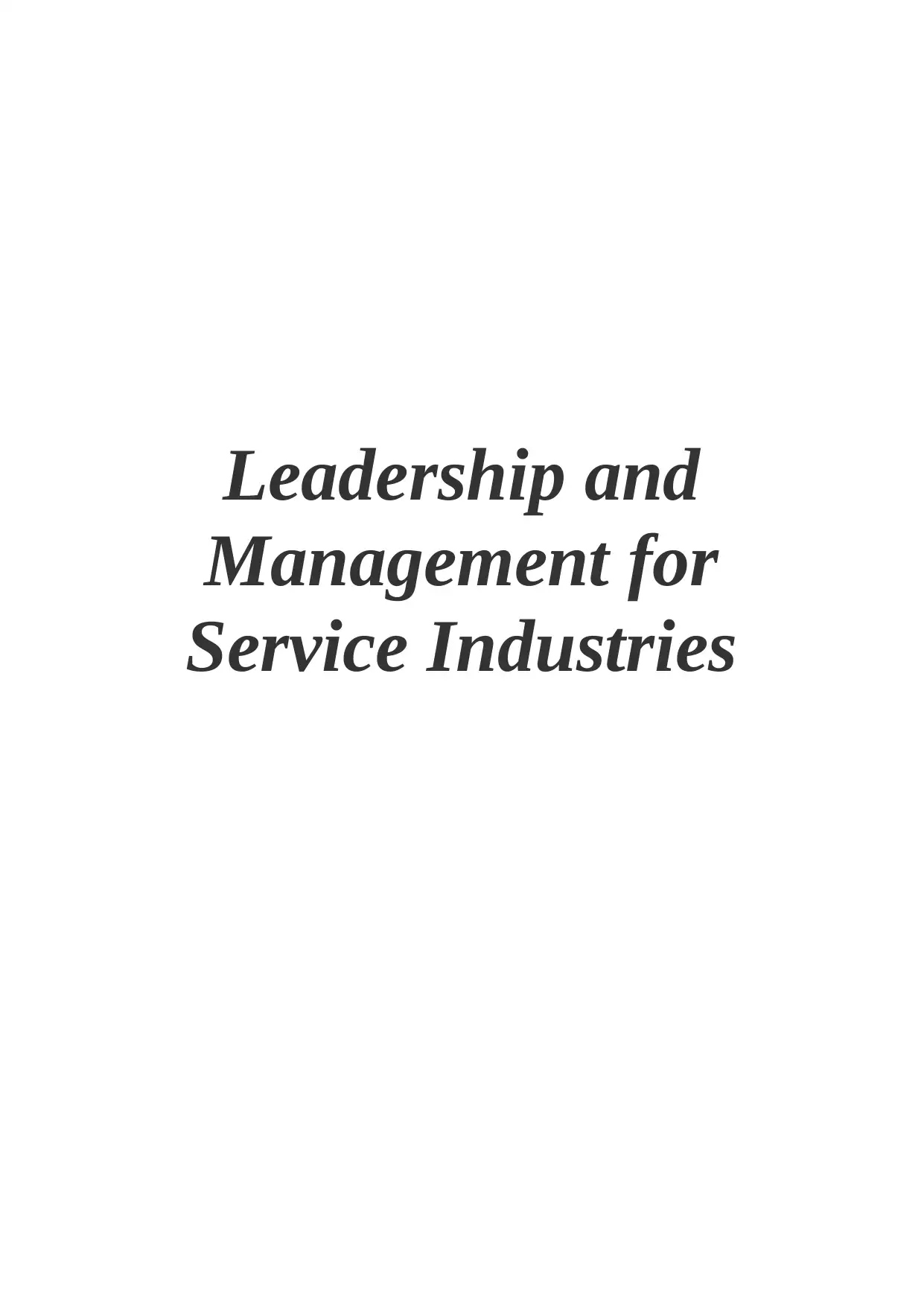
Leadership and
Management for
Service Industries
Management for
Service Industries
Paraphrase This Document
Need a fresh take? Get an instant paraphrase of this document with our AI Paraphraser
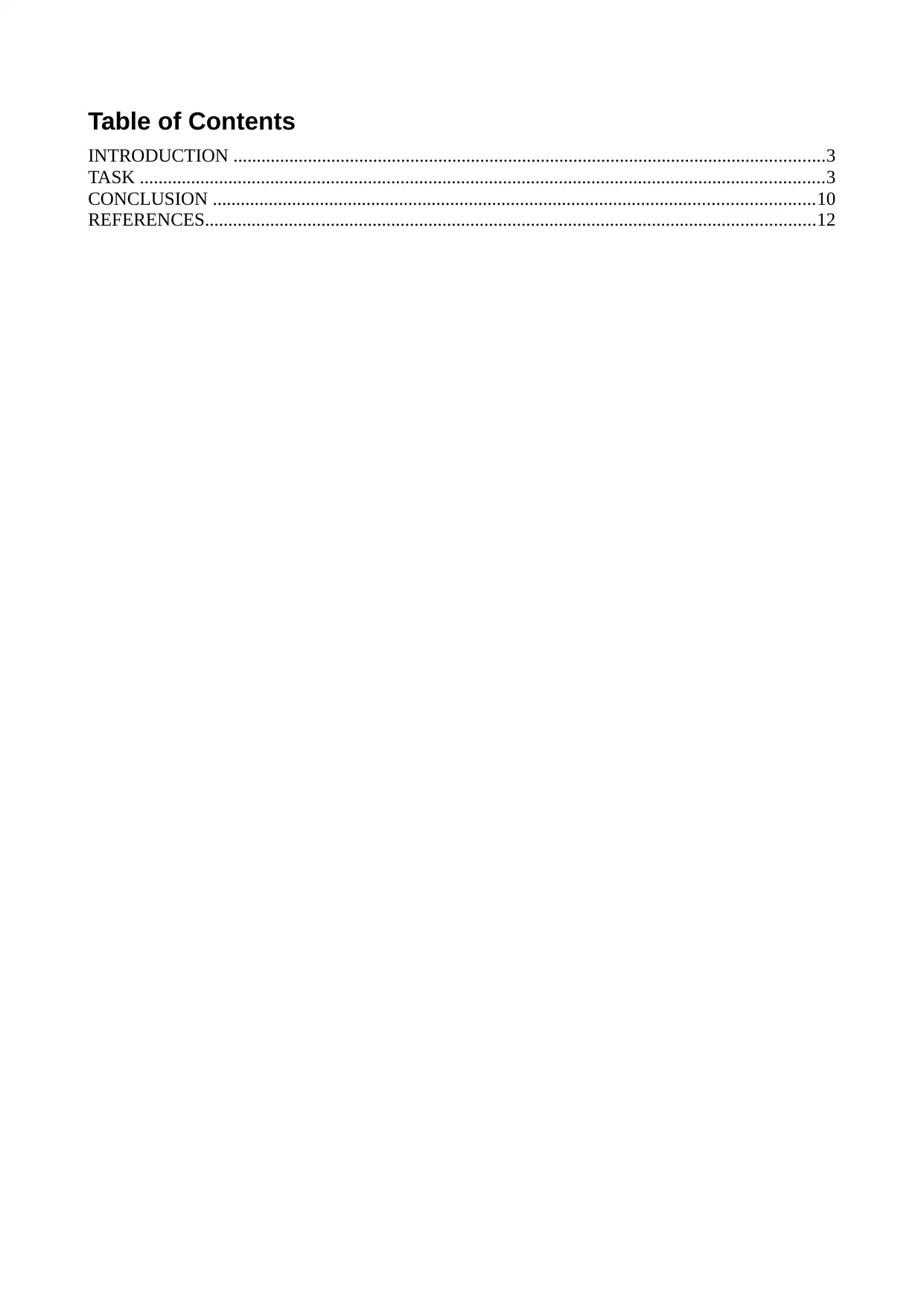
Table of Contents
INTRODUCTION ...............................................................................................................................3
TASK ...................................................................................................................................................3
CONCLUSION .................................................................................................................................10
REFERENCES...................................................................................................................................12
INTRODUCTION ...............................................................................................................................3
TASK ...................................................................................................................................................3
CONCLUSION .................................................................................................................................10
REFERENCES...................................................................................................................................12
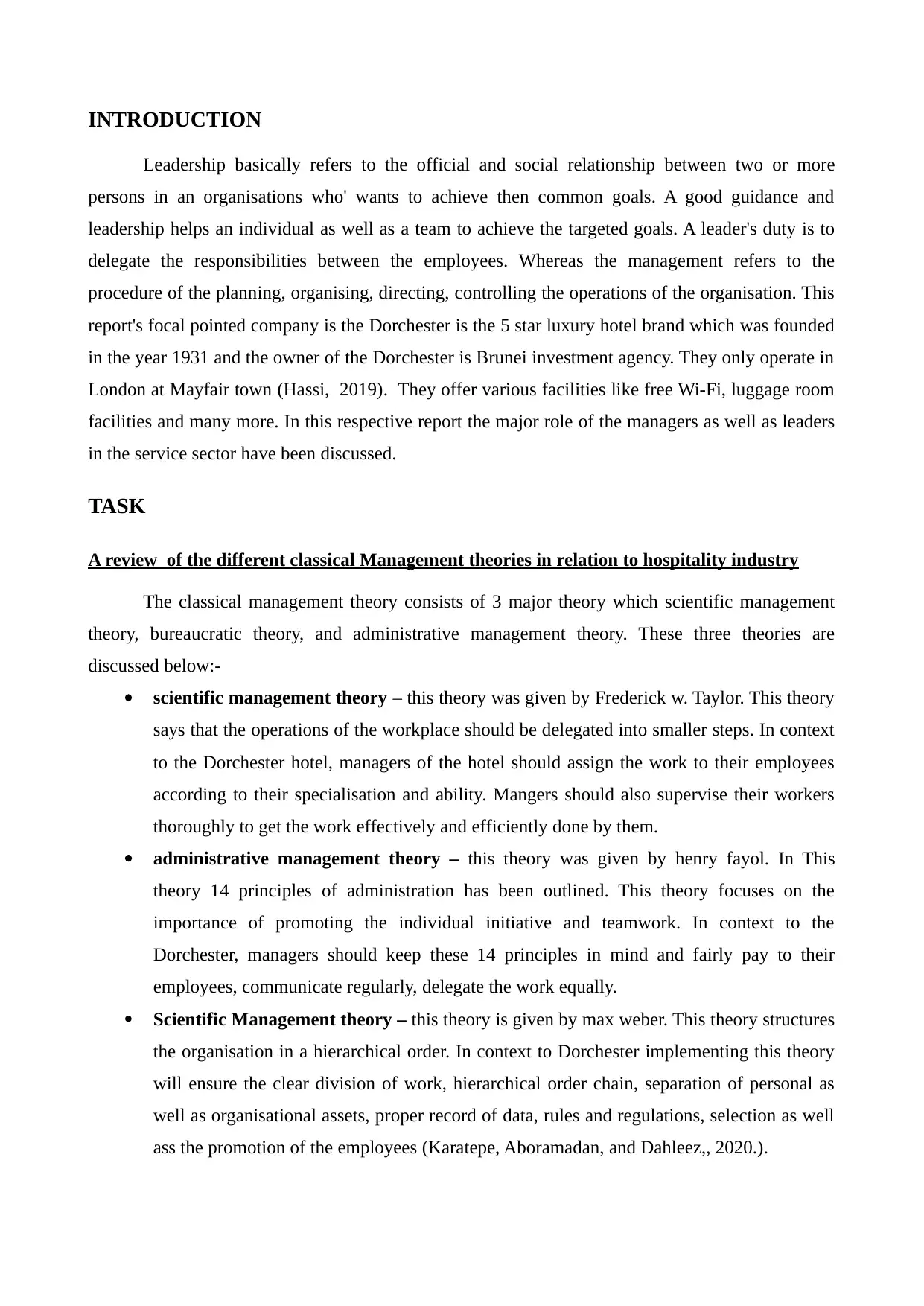
INTRODUCTION
Leadership basically refers to the official and social relationship between two or more
persons in an organisations who' wants to achieve then common goals. A good guidance and
leadership helps an individual as well as a team to achieve the targeted goals. A leader's duty is to
delegate the responsibilities between the employees. Whereas the management refers to the
procedure of the planning, organising, directing, controlling the operations of the organisation. This
report's focal pointed company is the Dorchester is the 5 star luxury hotel brand which was founded
in the year 1931 and the owner of the Dorchester is Brunei investment agency. They only operate in
London at Mayfair town (Hassi, 2019). They offer various facilities like free Wi-Fi, luggage room
facilities and many more. In this respective report the major role of the managers as well as leaders
in the service sector have been discussed.
TASK
A review of the different classical Management theories in relation to hospitality industry
The classical management theory consists of 3 major theory which scientific management
theory, bureaucratic theory, and administrative management theory. These three theories are
discussed below:-
scientific management theory – this theory was given by Frederick w. Taylor. This theory
says that the operations of the workplace should be delegated into smaller steps. In context
to the Dorchester hotel, managers of the hotel should assign the work to their employees
according to their specialisation and ability. Mangers should also supervise their workers
thoroughly to get the work effectively and efficiently done by them.
administrative management theory – this theory was given by henry fayol. In This
theory 14 principles of administration has been outlined. This theory focuses on the
importance of promoting the individual initiative and teamwork. In context to the
Dorchester, managers should keep these 14 principles in mind and fairly pay to their
employees, communicate regularly, delegate the work equally.
Scientific Management theory – this theory is given by max weber. This theory structures
the organisation in a hierarchical order. In context to Dorchester implementing this theory
will ensure the clear division of work, hierarchical order chain, separation of personal as
well as organisational assets, proper record of data, rules and regulations, selection as well
ass the promotion of the employees (Karatepe, Aboramadan, and Dahleez,, 2020.).
Leadership basically refers to the official and social relationship between two or more
persons in an organisations who' wants to achieve then common goals. A good guidance and
leadership helps an individual as well as a team to achieve the targeted goals. A leader's duty is to
delegate the responsibilities between the employees. Whereas the management refers to the
procedure of the planning, organising, directing, controlling the operations of the organisation. This
report's focal pointed company is the Dorchester is the 5 star luxury hotel brand which was founded
in the year 1931 and the owner of the Dorchester is Brunei investment agency. They only operate in
London at Mayfair town (Hassi, 2019). They offer various facilities like free Wi-Fi, luggage room
facilities and many more. In this respective report the major role of the managers as well as leaders
in the service sector have been discussed.
TASK
A review of the different classical Management theories in relation to hospitality industry
The classical management theory consists of 3 major theory which scientific management
theory, bureaucratic theory, and administrative management theory. These three theories are
discussed below:-
scientific management theory – this theory was given by Frederick w. Taylor. This theory
says that the operations of the workplace should be delegated into smaller steps. In context
to the Dorchester hotel, managers of the hotel should assign the work to their employees
according to their specialisation and ability. Mangers should also supervise their workers
thoroughly to get the work effectively and efficiently done by them.
administrative management theory – this theory was given by henry fayol. In This
theory 14 principles of administration has been outlined. This theory focuses on the
importance of promoting the individual initiative and teamwork. In context to the
Dorchester, managers should keep these 14 principles in mind and fairly pay to their
employees, communicate regularly, delegate the work equally.
Scientific Management theory – this theory is given by max weber. This theory structures
the organisation in a hierarchical order. In context to Dorchester implementing this theory
will ensure the clear division of work, hierarchical order chain, separation of personal as
well as organisational assets, proper record of data, rules and regulations, selection as well
ass the promotion of the employees (Karatepe, Aboramadan, and Dahleez,, 2020.).
⊘ This is a preview!⊘
Do you want full access?
Subscribe today to unlock all pages.

Trusted by 1+ million students worldwide
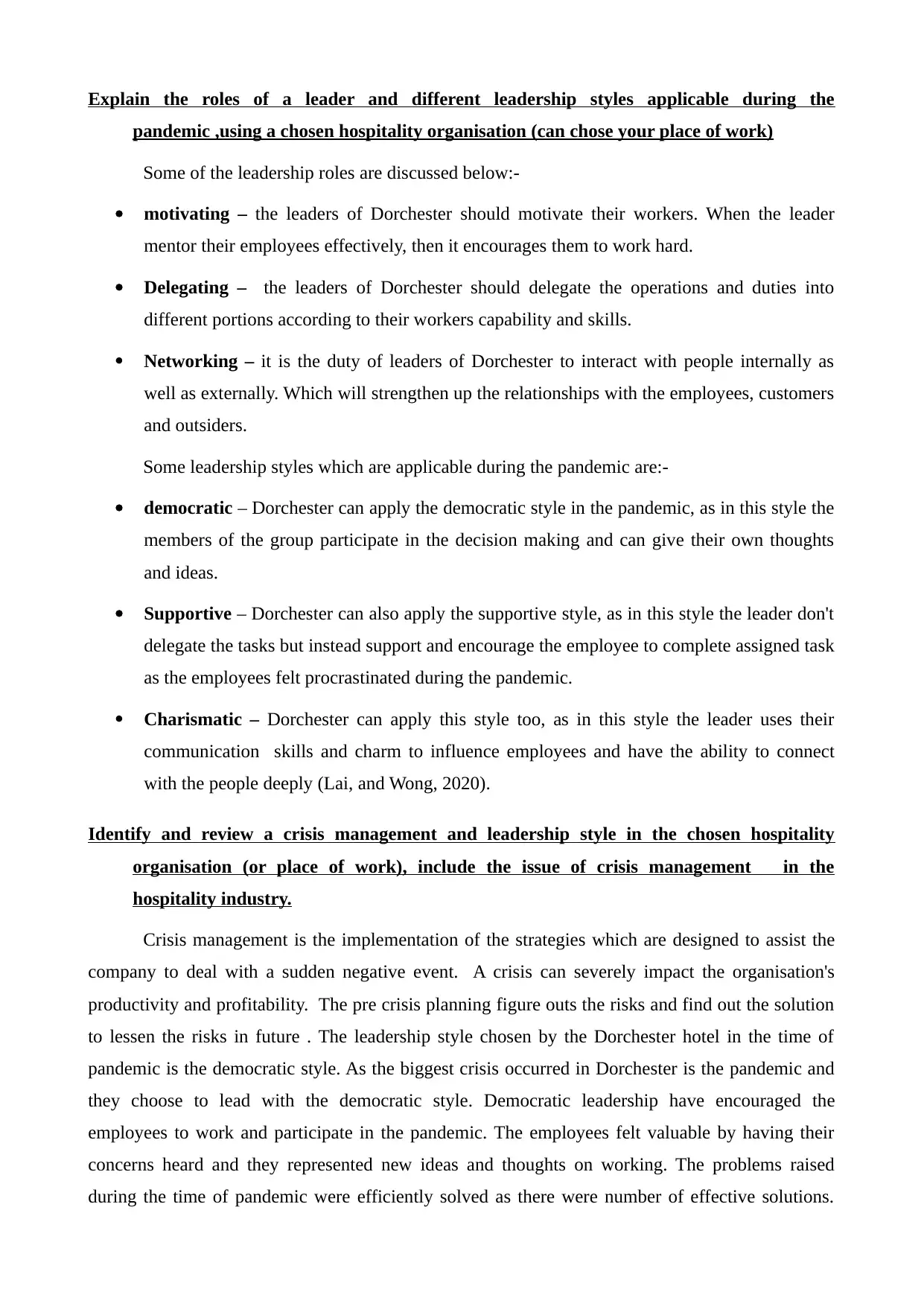
Explain the roles of a leader and different leadership styles applicable during the
pandemic ,using a chosen hospitality organisation (can chose your place of work)
Some of the leadership roles are discussed below:-
motivating – the leaders of Dorchester should motivate their workers. When the leader
mentor their employees effectively, then it encourages them to work hard.
Delegating – the leaders of Dorchester should delegate the operations and duties into
different portions according to their workers capability and skills.
Networking – it is the duty of leaders of Dorchester to interact with people internally as
well as externally. Which will strengthen up the relationships with the employees, customers
and outsiders.
Some leadership styles which are applicable during the pandemic are:-
democratic – Dorchester can apply the democratic style in the pandemic, as in this style the
members of the group participate in the decision making and can give their own thoughts
and ideas.
Supportive – Dorchester can also apply the supportive style, as in this style the leader don't
delegate the tasks but instead support and encourage the employee to complete assigned task
as the employees felt procrastinated during the pandemic.
Charismatic – Dorchester can apply this style too, as in this style the leader uses their
communication skills and charm to influence employees and have the ability to connect
with the people deeply (Lai, and Wong, 2020).
Identify and review a crisis management and leadership style in the chosen hospitality
organisation (or place of work), include the issue of crisis management in the
hospitality industry.
Crisis management is the implementation of the strategies which are designed to assist the
company to deal with a sudden negative event. A crisis can severely impact the organisation's
productivity and profitability. The pre crisis planning figure outs the risks and find out the solution
to lessen the risks in future . The leadership style chosen by the Dorchester hotel in the time of
pandemic is the democratic style. As the biggest crisis occurred in Dorchester is the pandemic and
they choose to lead with the democratic style. Democratic leadership have encouraged the
employees to work and participate in the pandemic. The employees felt valuable by having their
concerns heard and they represented new ideas and thoughts on working. The problems raised
during the time of pandemic were efficiently solved as there were number of effective solutions.
pandemic ,using a chosen hospitality organisation (can chose your place of work)
Some of the leadership roles are discussed below:-
motivating – the leaders of Dorchester should motivate their workers. When the leader
mentor their employees effectively, then it encourages them to work hard.
Delegating – the leaders of Dorchester should delegate the operations and duties into
different portions according to their workers capability and skills.
Networking – it is the duty of leaders of Dorchester to interact with people internally as
well as externally. Which will strengthen up the relationships with the employees, customers
and outsiders.
Some leadership styles which are applicable during the pandemic are:-
democratic – Dorchester can apply the democratic style in the pandemic, as in this style the
members of the group participate in the decision making and can give their own thoughts
and ideas.
Supportive – Dorchester can also apply the supportive style, as in this style the leader don't
delegate the tasks but instead support and encourage the employee to complete assigned task
as the employees felt procrastinated during the pandemic.
Charismatic – Dorchester can apply this style too, as in this style the leader uses their
communication skills and charm to influence employees and have the ability to connect
with the people deeply (Lai, and Wong, 2020).
Identify and review a crisis management and leadership style in the chosen hospitality
organisation (or place of work), include the issue of crisis management in the
hospitality industry.
Crisis management is the implementation of the strategies which are designed to assist the
company to deal with a sudden negative event. A crisis can severely impact the organisation's
productivity and profitability. The pre crisis planning figure outs the risks and find out the solution
to lessen the risks in future . The leadership style chosen by the Dorchester hotel in the time of
pandemic is the democratic style. As the biggest crisis occurred in Dorchester is the pandemic and
they choose to lead with the democratic style. Democratic leadership have encouraged the
employees to work and participate in the pandemic. The employees felt valuable by having their
concerns heard and they represented new ideas and thoughts on working. The problems raised
during the time of pandemic were efficiently solved as there were number of effective solutions.
Paraphrase This Document
Need a fresh take? Get an instant paraphrase of this document with our AI Paraphraser
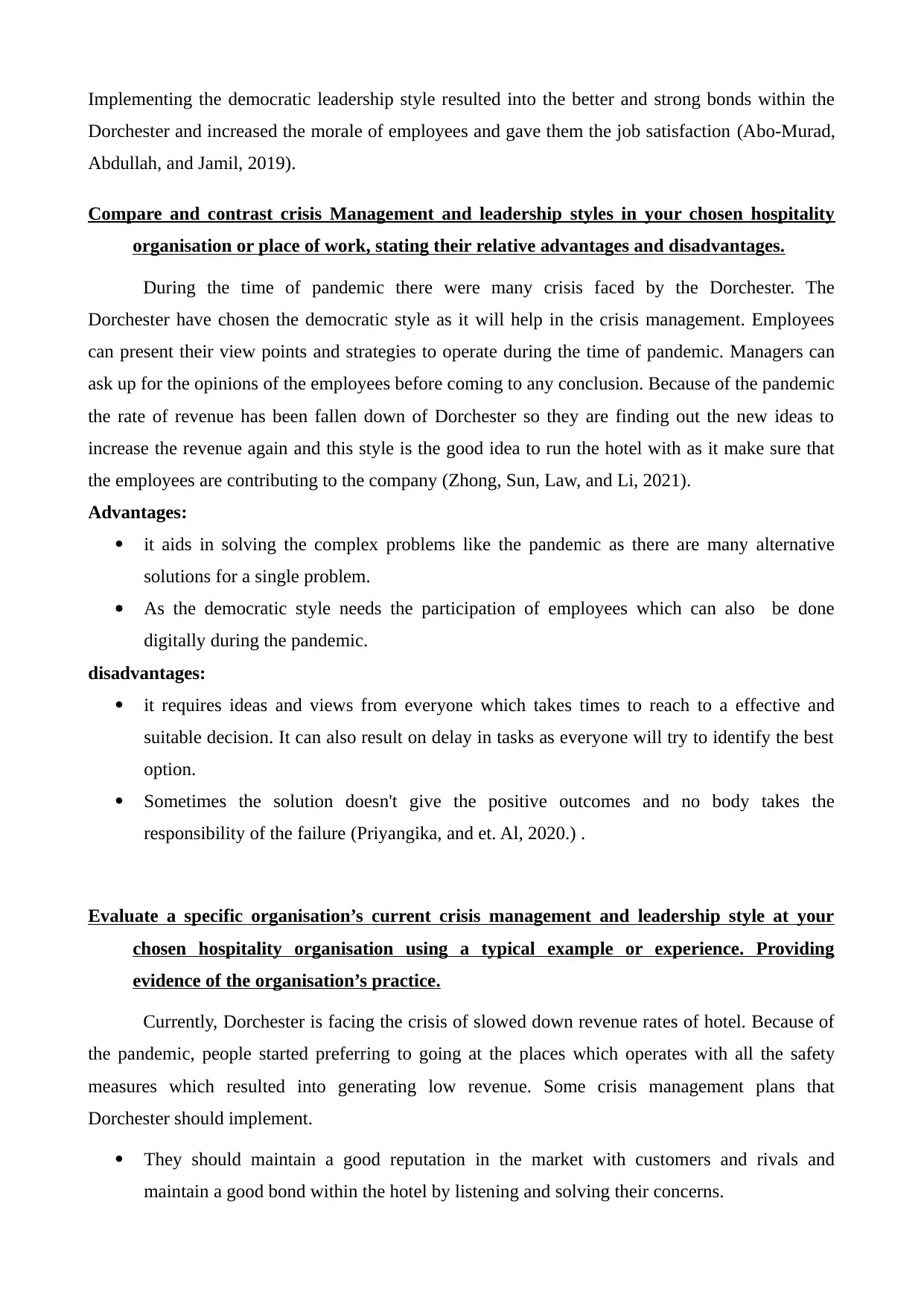
Implementing the democratic leadership style resulted into the better and strong bonds within the
Dorchester and increased the morale of employees and gave them the job satisfaction (Abo-Murad,
Abdullah, and Jamil, 2019).
Compare and contrast crisis Management and leadership styles in your chosen hospitality
organisation or place of work, stating their relative advantages and disadvantages.
During the time of pandemic there were many crisis faced by the Dorchester. The
Dorchester have chosen the democratic style as it will help in the crisis management. Employees
can present their view points and strategies to operate during the time of pandemic. Managers can
ask up for the opinions of the employees before coming to any conclusion. Because of the pandemic
the rate of revenue has been fallen down of Dorchester so they are finding out the new ideas to
increase the revenue again and this style is the good idea to run the hotel with as it make sure that
the employees are contributing to the company (Zhong, Sun, Law, and Li, 2021).
Advantages:
it aids in solving the complex problems like the pandemic as there are many alternative
solutions for a single problem.
As the democratic style needs the participation of employees which can also be done
digitally during the pandemic.
disadvantages:
it requires ideas and views from everyone which takes times to reach to a effective and
suitable decision. It can also result on delay in tasks as everyone will try to identify the best
option.
Sometimes the solution doesn't give the positive outcomes and no body takes the
responsibility of the failure (Priyangika, and et. Al, 2020.) .
Evaluate a specific organisation’s current crisis management and leadership style at your
chosen hospitality organisation using a typical example or experience. Providing
evidence of the organisation’s practice.
Currently, Dorchester is facing the crisis of slowed down revenue rates of hotel. Because of
the pandemic, people started preferring to going at the places which operates with all the safety
measures which resulted into generating low revenue. Some crisis management plans that
Dorchester should implement.
They should maintain a good reputation in the market with customers and rivals and
maintain a good bond within the hotel by listening and solving their concerns.
Dorchester and increased the morale of employees and gave them the job satisfaction (Abo-Murad,
Abdullah, and Jamil, 2019).
Compare and contrast crisis Management and leadership styles in your chosen hospitality
organisation or place of work, stating their relative advantages and disadvantages.
During the time of pandemic there were many crisis faced by the Dorchester. The
Dorchester have chosen the democratic style as it will help in the crisis management. Employees
can present their view points and strategies to operate during the time of pandemic. Managers can
ask up for the opinions of the employees before coming to any conclusion. Because of the pandemic
the rate of revenue has been fallen down of Dorchester so they are finding out the new ideas to
increase the revenue again and this style is the good idea to run the hotel with as it make sure that
the employees are contributing to the company (Zhong, Sun, Law, and Li, 2021).
Advantages:
it aids in solving the complex problems like the pandemic as there are many alternative
solutions for a single problem.
As the democratic style needs the participation of employees which can also be done
digitally during the pandemic.
disadvantages:
it requires ideas and views from everyone which takes times to reach to a effective and
suitable decision. It can also result on delay in tasks as everyone will try to identify the best
option.
Sometimes the solution doesn't give the positive outcomes and no body takes the
responsibility of the failure (Priyangika, and et. Al, 2020.) .
Evaluate a specific organisation’s current crisis management and leadership style at your
chosen hospitality organisation using a typical example or experience. Providing
evidence of the organisation’s practice.
Currently, Dorchester is facing the crisis of slowed down revenue rates of hotel. Because of
the pandemic, people started preferring to going at the places which operates with all the safety
measures which resulted into generating low revenue. Some crisis management plans that
Dorchester should implement.
They should maintain a good reputation in the market with customers and rivals and
maintain a good bond within the hotel by listening and solving their concerns.
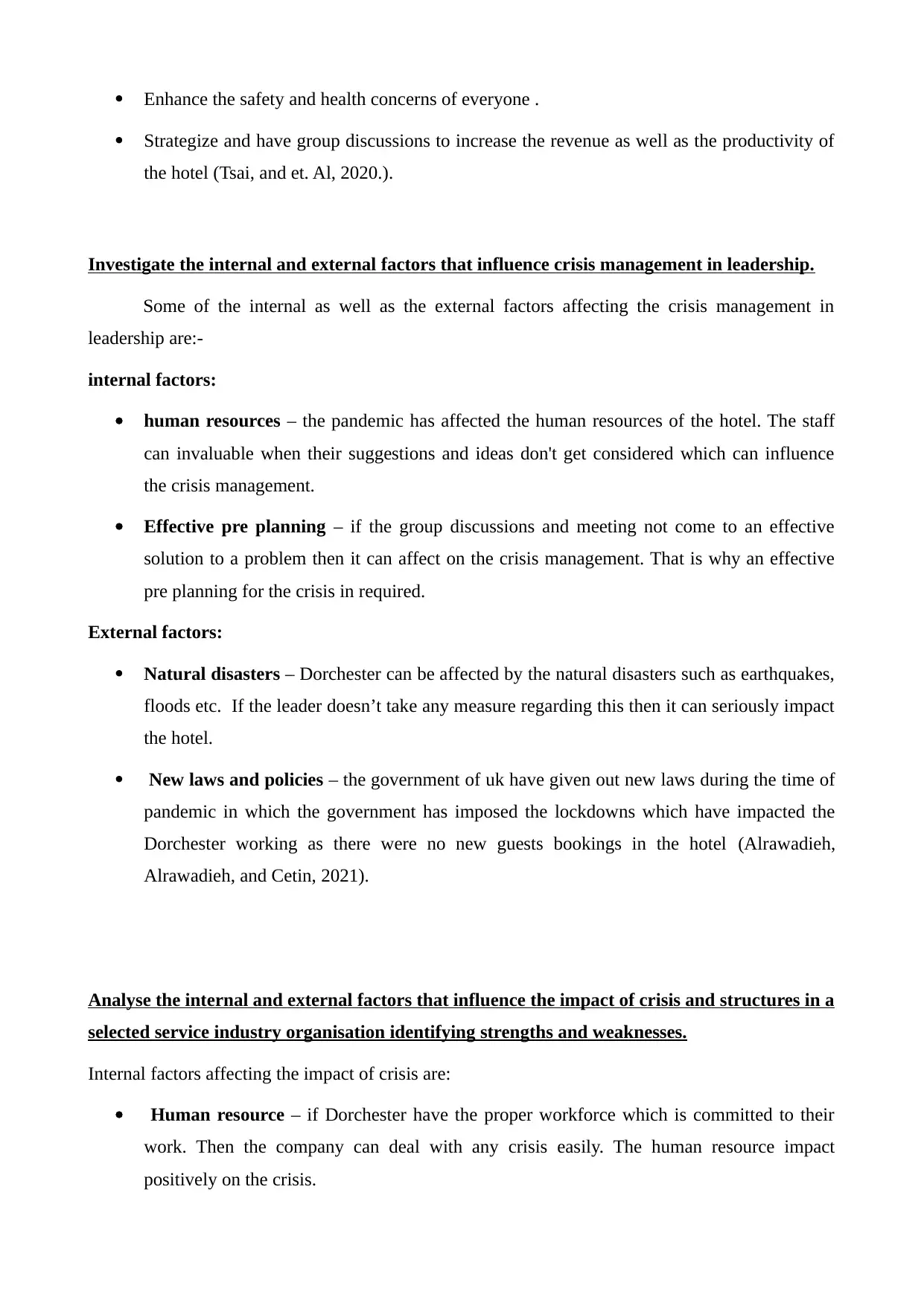
Enhance the safety and health concerns of everyone .
Strategize and have group discussions to increase the revenue as well as the productivity of
the hotel (Tsai, and et. Al, 2020.).
Investigate the internal and external factors that influence crisis management in leadership.
Some of the internal as well as the external factors affecting the crisis management in
leadership are:-
internal factors:
human resources – the pandemic has affected the human resources of the hotel. The staff
can invaluable when their suggestions and ideas don't get considered which can influence
the crisis management.
Effective pre planning – if the group discussions and meeting not come to an effective
solution to a problem then it can affect on the crisis management. That is why an effective
pre planning for the crisis in required.
External factors:
Natural disasters – Dorchester can be affected by the natural disasters such as earthquakes,
floods etc. If the leader doesn’t take any measure regarding this then it can seriously impact
the hotel.
New laws and policies – the government of uk have given out new laws during the time of
pandemic in which the government has imposed the lockdowns which have impacted the
Dorchester working as there were no new guests bookings in the hotel (Alrawadieh,
Alrawadieh, and Cetin, 2021).
Analyse the internal and external factors that influence the impact of crisis and structures in a
selected service industry organisation identifying strengths and weaknesses.
Internal factors affecting the impact of crisis are:
Human resource – if Dorchester have the proper workforce which is committed to their
work. Then the company can deal with any crisis easily. The human resource impact
positively on the crisis.
Strategize and have group discussions to increase the revenue as well as the productivity of
the hotel (Tsai, and et. Al, 2020.).
Investigate the internal and external factors that influence crisis management in leadership.
Some of the internal as well as the external factors affecting the crisis management in
leadership are:-
internal factors:
human resources – the pandemic has affected the human resources of the hotel. The staff
can invaluable when their suggestions and ideas don't get considered which can influence
the crisis management.
Effective pre planning – if the group discussions and meeting not come to an effective
solution to a problem then it can affect on the crisis management. That is why an effective
pre planning for the crisis in required.
External factors:
Natural disasters – Dorchester can be affected by the natural disasters such as earthquakes,
floods etc. If the leader doesn’t take any measure regarding this then it can seriously impact
the hotel.
New laws and policies – the government of uk have given out new laws during the time of
pandemic in which the government has imposed the lockdowns which have impacted the
Dorchester working as there were no new guests bookings in the hotel (Alrawadieh,
Alrawadieh, and Cetin, 2021).
Analyse the internal and external factors that influence the impact of crisis and structures in a
selected service industry organisation identifying strengths and weaknesses.
Internal factors affecting the impact of crisis are:
Human resource – if Dorchester have the proper workforce which is committed to their
work. Then the company can deal with any crisis easily. The human resource impact
positively on the crisis.
⊘ This is a preview!⊘
Do you want full access?
Subscribe today to unlock all pages.

Trusted by 1+ million students worldwide
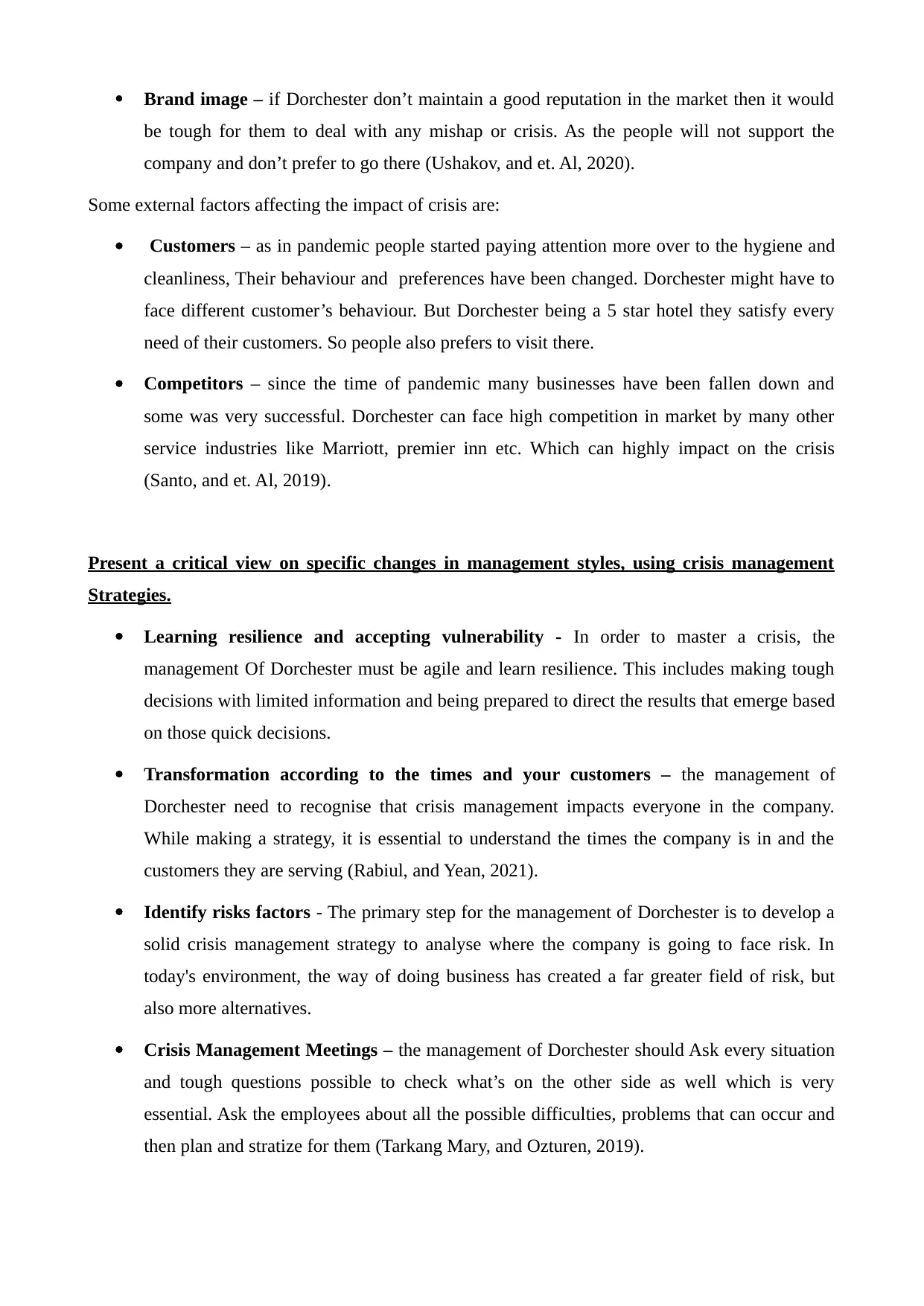
Brand image – if Dorchester don’t maintain a good reputation in the market then it would
be tough for them to deal with any mishap or crisis. As the people will not support the
company and don’t prefer to go there (Ushakov, and et. Al, 2020).
Some external factors affecting the impact of crisis are:
Customers – as in pandemic people started paying attention more over to the hygiene and
cleanliness, Their behaviour and preferences have been changed. Dorchester might have to
face different customer’s behaviour. But Dorchester being a 5 star hotel they satisfy every
need of their customers. So people also prefers to visit there.
Competitors – since the time of pandemic many businesses have been fallen down and
some was very successful. Dorchester can face high competition in market by many other
service industries like Marriott, premier inn etc. Which can highly impact on the crisis
(Santo, and et. Al, 2019).
Present a critical view on specific changes in management styles, using crisis management
Strategies.
Learning resilience and accepting vulnerability - In order to master a crisis, the
management Of Dorchester must be agile and learn resilience. This includes making tough
decisions with limited information and being prepared to direct the results that emerge based
on those quick decisions.
Transformation according to the times and your customers – the management of
Dorchester need to recognise that crisis management impacts everyone in the company.
While making a strategy, it is essential to understand the times the company is in and the
customers they are serving (Rabiul, and Yean, 2021).
Identify risks factors - The primary step for the management of Dorchester is to develop a
solid crisis management strategy to analyse where the company is going to face risk. In
today's environment, the way of doing business has created a far greater field of risk, but
also more alternatives.
Crisis Management Meetings – the management of Dorchester should Ask every situation
and tough questions possible to check what’s on the other side as well which is very
essential. Ask the employees about all the possible difficulties, problems that can occur and
then plan and stratize for them (Tarkang Mary, and Ozturen, 2019).
be tough for them to deal with any mishap or crisis. As the people will not support the
company and don’t prefer to go there (Ushakov, and et. Al, 2020).
Some external factors affecting the impact of crisis are:
Customers – as in pandemic people started paying attention more over to the hygiene and
cleanliness, Their behaviour and preferences have been changed. Dorchester might have to
face different customer’s behaviour. But Dorchester being a 5 star hotel they satisfy every
need of their customers. So people also prefers to visit there.
Competitors – since the time of pandemic many businesses have been fallen down and
some was very successful. Dorchester can face high competition in market by many other
service industries like Marriott, premier inn etc. Which can highly impact on the crisis
(Santo, and et. Al, 2019).
Present a critical view on specific changes in management styles, using crisis management
Strategies.
Learning resilience and accepting vulnerability - In order to master a crisis, the
management Of Dorchester must be agile and learn resilience. This includes making tough
decisions with limited information and being prepared to direct the results that emerge based
on those quick decisions.
Transformation according to the times and your customers – the management of
Dorchester need to recognise that crisis management impacts everyone in the company.
While making a strategy, it is essential to understand the times the company is in and the
customers they are serving (Rabiul, and Yean, 2021).
Identify risks factors - The primary step for the management of Dorchester is to develop a
solid crisis management strategy to analyse where the company is going to face risk. In
today's environment, the way of doing business has created a far greater field of risk, but
also more alternatives.
Crisis Management Meetings – the management of Dorchester should Ask every situation
and tough questions possible to check what’s on the other side as well which is very
essential. Ask the employees about all the possible difficulties, problems that can occur and
then plan and stratize for them (Tarkang Mary, and Ozturen, 2019).
Paraphrase This Document
Need a fresh take? Get an instant paraphrase of this document with our AI Paraphraser
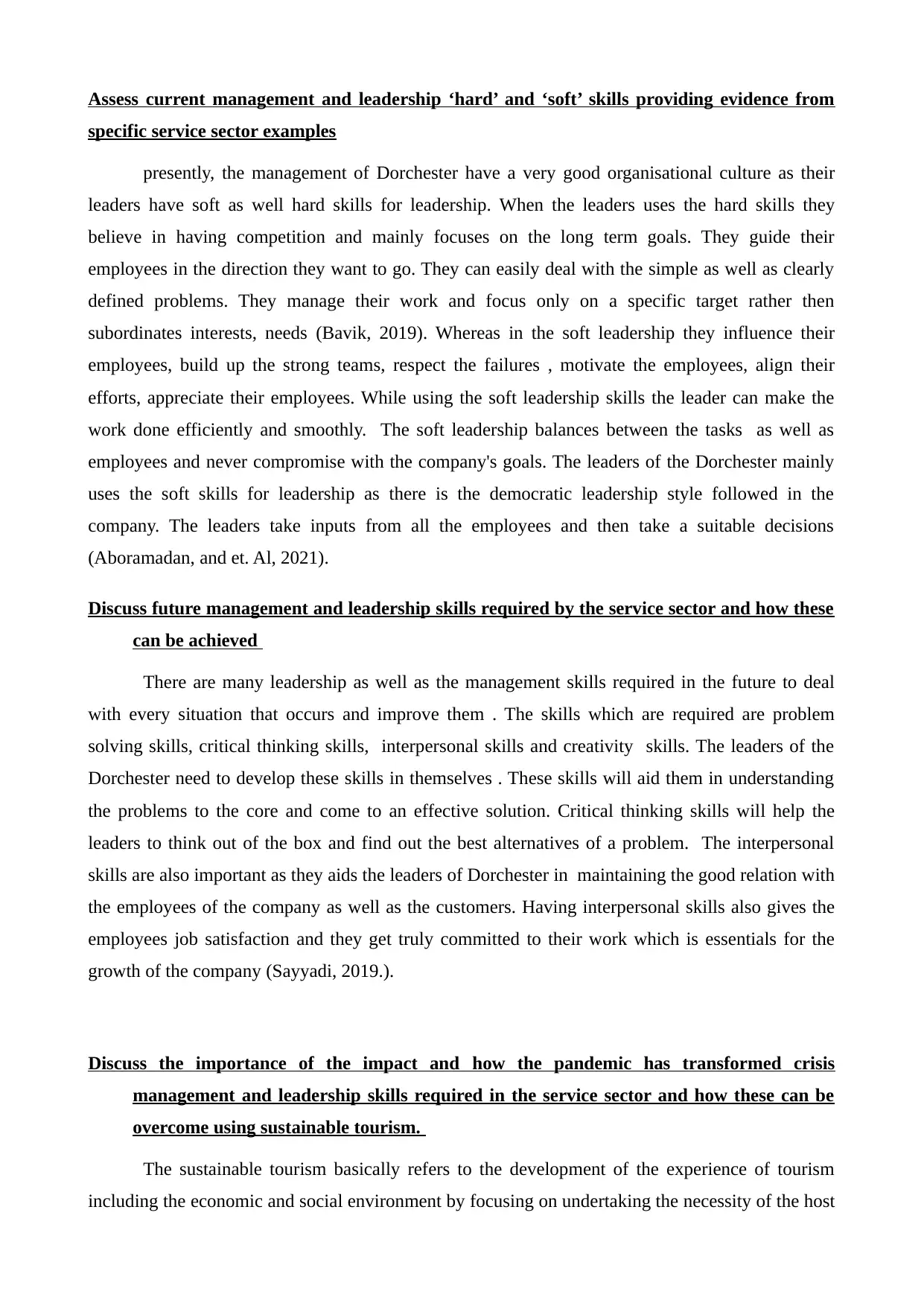
Assess current management and leadership ‘hard’ and ‘soft’ skills providing evidence from
specific service sector examples
presently, the management of Dorchester have a very good organisational culture as their
leaders have soft as well hard skills for leadership. When the leaders uses the hard skills they
believe in having competition and mainly focuses on the long term goals. They guide their
employees in the direction they want to go. They can easily deal with the simple as well as clearly
defined problems. They manage their work and focus only on a specific target rather then
subordinates interests, needs (Bavik, 2019). Whereas in the soft leadership they influence their
employees, build up the strong teams, respect the failures , motivate the employees, align their
efforts, appreciate their employees. While using the soft leadership skills the leader can make the
work done efficiently and smoothly. The soft leadership balances between the tasks as well as
employees and never compromise with the company's goals. The leaders of the Dorchester mainly
uses the soft skills for leadership as there is the democratic leadership style followed in the
company. The leaders take inputs from all the employees and then take a suitable decisions
(Aboramadan, and et. Al, 2021).
Discuss future management and leadership skills required by the service sector and how these
can be achieved
There are many leadership as well as the management skills required in the future to deal
with every situation that occurs and improve them . The skills which are required are problem
solving skills, critical thinking skills, interpersonal skills and creativity skills. The leaders of the
Dorchester need to develop these skills in themselves . These skills will aid them in understanding
the problems to the core and come to an effective solution. Critical thinking skills will help the
leaders to think out of the box and find out the best alternatives of a problem. The interpersonal
skills are also important as they aids the leaders of Dorchester in maintaining the good relation with
the employees of the company as well as the customers. Having interpersonal skills also gives the
employees job satisfaction and they get truly committed to their work which is essentials for the
growth of the company (Sayyadi, 2019.).
Discuss the importance of the impact and how the pandemic has transformed crisis
management and leadership skills required in the service sector and how these can be
overcome using sustainable tourism.
The sustainable tourism basically refers to the development of the experience of tourism
including the economic and social environment by focusing on undertaking the necessity of the host
specific service sector examples
presently, the management of Dorchester have a very good organisational culture as their
leaders have soft as well hard skills for leadership. When the leaders uses the hard skills they
believe in having competition and mainly focuses on the long term goals. They guide their
employees in the direction they want to go. They can easily deal with the simple as well as clearly
defined problems. They manage their work and focus only on a specific target rather then
subordinates interests, needs (Bavik, 2019). Whereas in the soft leadership they influence their
employees, build up the strong teams, respect the failures , motivate the employees, align their
efforts, appreciate their employees. While using the soft leadership skills the leader can make the
work done efficiently and smoothly. The soft leadership balances between the tasks as well as
employees and never compromise with the company's goals. The leaders of the Dorchester mainly
uses the soft skills for leadership as there is the democratic leadership style followed in the
company. The leaders take inputs from all the employees and then take a suitable decisions
(Aboramadan, and et. Al, 2021).
Discuss future management and leadership skills required by the service sector and how these
can be achieved
There are many leadership as well as the management skills required in the future to deal
with every situation that occurs and improve them . The skills which are required are problem
solving skills, critical thinking skills, interpersonal skills and creativity skills. The leaders of the
Dorchester need to develop these skills in themselves . These skills will aid them in understanding
the problems to the core and come to an effective solution. Critical thinking skills will help the
leaders to think out of the box and find out the best alternatives of a problem. The interpersonal
skills are also important as they aids the leaders of Dorchester in maintaining the good relation with
the employees of the company as well as the customers. Having interpersonal skills also gives the
employees job satisfaction and they get truly committed to their work which is essentials for the
growth of the company (Sayyadi, 2019.).
Discuss the importance of the impact and how the pandemic has transformed crisis
management and leadership skills required in the service sector and how these can be
overcome using sustainable tourism.
The sustainable tourism basically refers to the development of the experience of tourism
including the economic and social environment by focusing on undertaking the necessity of the host
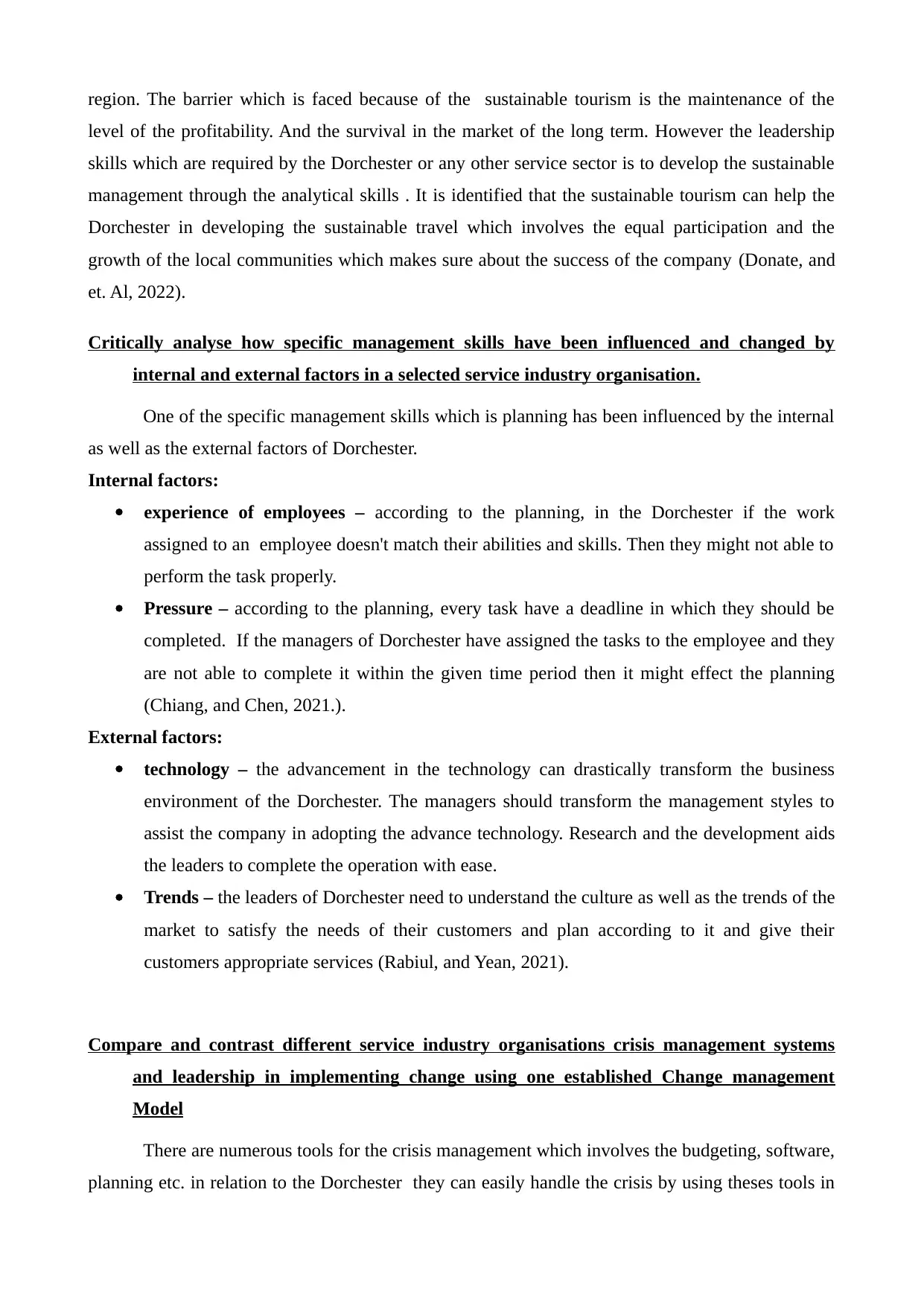
region. The barrier which is faced because of the sustainable tourism is the maintenance of the
level of the profitability. And the survival in the market of the long term. However the leadership
skills which are required by the Dorchester or any other service sector is to develop the sustainable
management through the analytical skills . It is identified that the sustainable tourism can help the
Dorchester in developing the sustainable travel which involves the equal participation and the
growth of the local communities which makes sure about the success of the company (Donate, and
et. Al, 2022).
Critically analyse how specific management skills have been influenced and changed by
internal and external factors in a selected service industry organisation.
One of the specific management skills which is planning has been influenced by the internal
as well as the external factors of Dorchester.
Internal factors:
experience of employees – according to the planning, in the Dorchester if the work
assigned to an employee doesn't match their abilities and skills. Then they might not able to
perform the task properly.
Pressure – according to the planning, every task have a deadline in which they should be
completed. If the managers of Dorchester have assigned the tasks to the employee and they
are not able to complete it within the given time period then it might effect the planning
(Chiang, and Chen, 2021.).
External factors:
technology – the advancement in the technology can drastically transform the business
environment of the Dorchester. The managers should transform the management styles to
assist the company in adopting the advance technology. Research and the development aids
the leaders to complete the operation with ease.
Trends – the leaders of Dorchester need to understand the culture as well as the trends of the
market to satisfy the needs of their customers and plan according to it and give their
customers appropriate services (Rabiul, and Yean, 2021).
Compare and contrast different service industry organisations crisis management systems
and leadership in implementing change using one established Change management
Model
There are numerous tools for the crisis management which involves the budgeting, software,
planning etc. in relation to the Dorchester they can easily handle the crisis by using theses tools in
level of the profitability. And the survival in the market of the long term. However the leadership
skills which are required by the Dorchester or any other service sector is to develop the sustainable
management through the analytical skills . It is identified that the sustainable tourism can help the
Dorchester in developing the sustainable travel which involves the equal participation and the
growth of the local communities which makes sure about the success of the company (Donate, and
et. Al, 2022).
Critically analyse how specific management skills have been influenced and changed by
internal and external factors in a selected service industry organisation.
One of the specific management skills which is planning has been influenced by the internal
as well as the external factors of Dorchester.
Internal factors:
experience of employees – according to the planning, in the Dorchester if the work
assigned to an employee doesn't match their abilities and skills. Then they might not able to
perform the task properly.
Pressure – according to the planning, every task have a deadline in which they should be
completed. If the managers of Dorchester have assigned the tasks to the employee and they
are not able to complete it within the given time period then it might effect the planning
(Chiang, and Chen, 2021.).
External factors:
technology – the advancement in the technology can drastically transform the business
environment of the Dorchester. The managers should transform the management styles to
assist the company in adopting the advance technology. Research and the development aids
the leaders to complete the operation with ease.
Trends – the leaders of Dorchester need to understand the culture as well as the trends of the
market to satisfy the needs of their customers and plan according to it and give their
customers appropriate services (Rabiul, and Yean, 2021).
Compare and contrast different service industry organisations crisis management systems
and leadership in implementing change using one established Change management
Model
There are numerous tools for the crisis management which involves the budgeting, software,
planning etc. in relation to the Dorchester they can easily handle the crisis by using theses tools in
⊘ This is a preview!⊘
Do you want full access?
Subscribe today to unlock all pages.

Trusted by 1+ million students worldwide
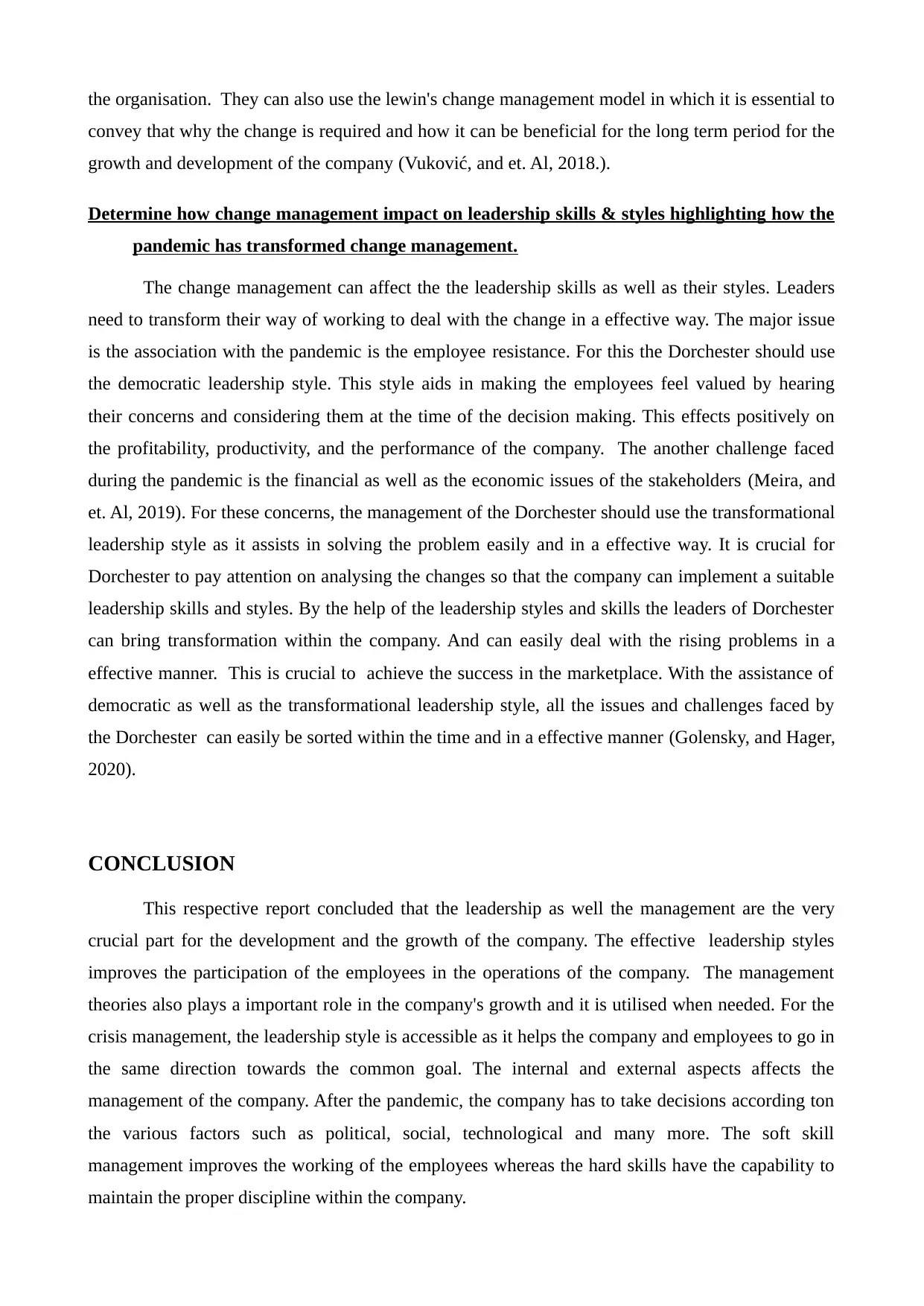
the organisation. They can also use the lewin's change management model in which it is essential to
convey that why the change is required and how it can be beneficial for the long term period for the
growth and development of the company (Vuković, and et. Al, 2018.).
Determine how change management impact on leadership skills & styles highlighting how the
pandemic has transformed change management.
The change management can affect the the leadership skills as well as their styles. Leaders
need to transform their way of working to deal with the change in a effective way. The major issue
is the association with the pandemic is the employee resistance. For this the Dorchester should use
the democratic leadership style. This style aids in making the employees feel valued by hearing
their concerns and considering them at the time of the decision making. This effects positively on
the profitability, productivity, and the performance of the company. The another challenge faced
during the pandemic is the financial as well as the economic issues of the stakeholders (Meira, and
et. Al, 2019). For these concerns, the management of the Dorchester should use the transformational
leadership style as it assists in solving the problem easily and in a effective way. It is crucial for
Dorchester to pay attention on analysing the changes so that the company can implement a suitable
leadership skills and styles. By the help of the leadership styles and skills the leaders of Dorchester
can bring transformation within the company. And can easily deal with the rising problems in a
effective manner. This is crucial to achieve the success in the marketplace. With the assistance of
democratic as well as the transformational leadership style, all the issues and challenges faced by
the Dorchester can easily be sorted within the time and in a effective manner (Golensky, and Hager,
2020).
CONCLUSION
This respective report concluded that the leadership as well the management are the very
crucial part for the development and the growth of the company. The effective leadership styles
improves the participation of the employees in the operations of the company. The management
theories also plays a important role in the company's growth and it is utilised when needed. For the
crisis management, the leadership style is accessible as it helps the company and employees to go in
the same direction towards the common goal. The internal and external aspects affects the
management of the company. After the pandemic, the company has to take decisions according ton
the various factors such as political, social, technological and many more. The soft skill
management improves the working of the employees whereas the hard skills have the capability to
maintain the proper discipline within the company.
convey that why the change is required and how it can be beneficial for the long term period for the
growth and development of the company (Vuković, and et. Al, 2018.).
Determine how change management impact on leadership skills & styles highlighting how the
pandemic has transformed change management.
The change management can affect the the leadership skills as well as their styles. Leaders
need to transform their way of working to deal with the change in a effective way. The major issue
is the association with the pandemic is the employee resistance. For this the Dorchester should use
the democratic leadership style. This style aids in making the employees feel valued by hearing
their concerns and considering them at the time of the decision making. This effects positively on
the profitability, productivity, and the performance of the company. The another challenge faced
during the pandemic is the financial as well as the economic issues of the stakeholders (Meira, and
et. Al, 2019). For these concerns, the management of the Dorchester should use the transformational
leadership style as it assists in solving the problem easily and in a effective way. It is crucial for
Dorchester to pay attention on analysing the changes so that the company can implement a suitable
leadership skills and styles. By the help of the leadership styles and skills the leaders of Dorchester
can bring transformation within the company. And can easily deal with the rising problems in a
effective manner. This is crucial to achieve the success in the marketplace. With the assistance of
democratic as well as the transformational leadership style, all the issues and challenges faced by
the Dorchester can easily be sorted within the time and in a effective manner (Golensky, and Hager,
2020).
CONCLUSION
This respective report concluded that the leadership as well the management are the very
crucial part for the development and the growth of the company. The effective leadership styles
improves the participation of the employees in the operations of the company. The management
theories also plays a important role in the company's growth and it is utilised when needed. For the
crisis management, the leadership style is accessible as it helps the company and employees to go in
the same direction towards the common goal. The internal and external aspects affects the
management of the company. After the pandemic, the company has to take decisions according ton
the various factors such as political, social, technological and many more. The soft skill
management improves the working of the employees whereas the hard skills have the capability to
maintain the proper discipline within the company.
Paraphrase This Document
Need a fresh take? Get an instant paraphrase of this document with our AI Paraphraser

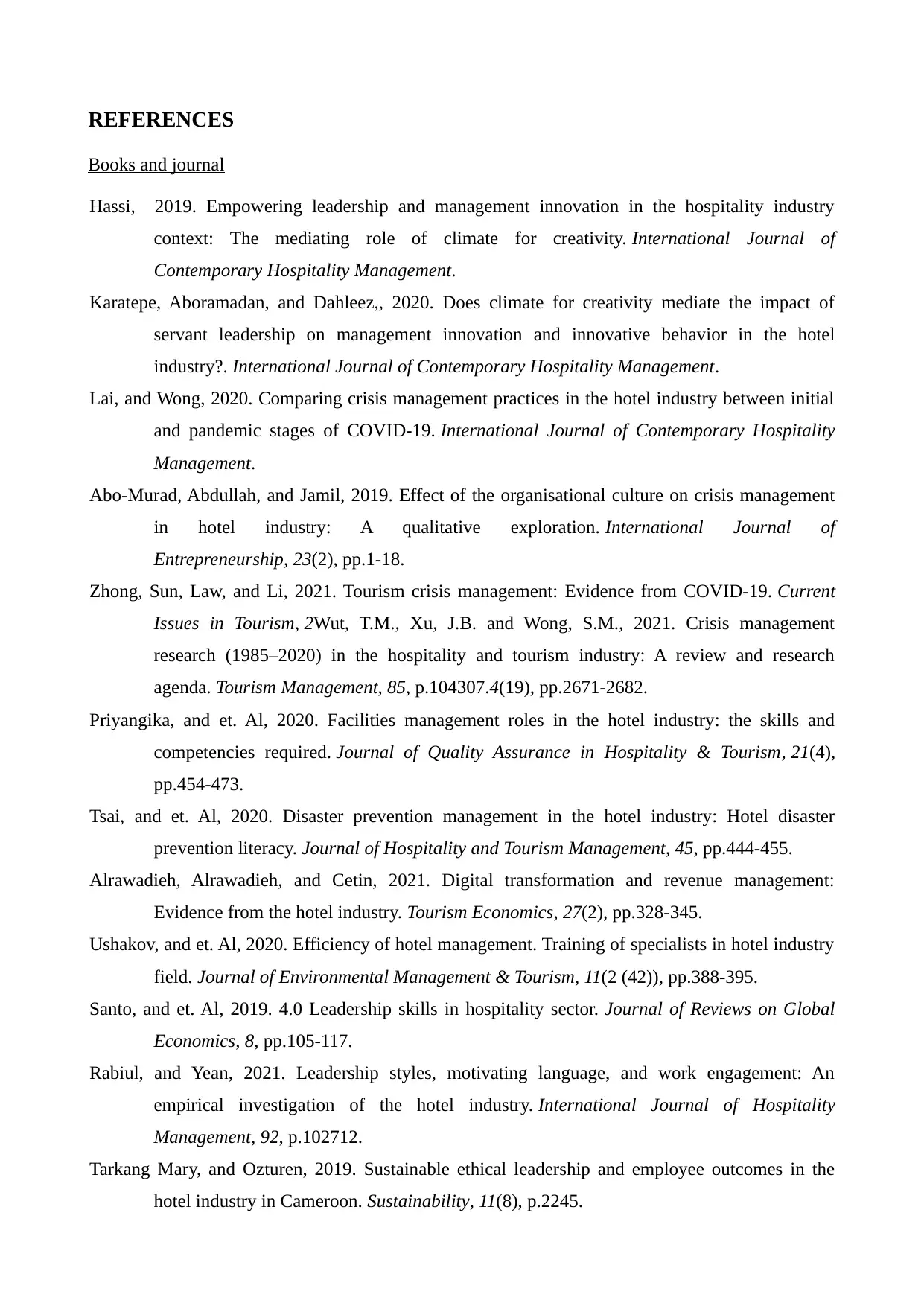
REFERENCES
Books and journal
Hassi, 2019. Empowering leadership and management innovation in the hospitality industry
context: The mediating role of climate for creativity. International Journal of
Contemporary Hospitality Management.
Karatepe, Aboramadan, and Dahleez,, 2020. Does climate for creativity mediate the impact of
servant leadership on management innovation and innovative behavior in the hotel
industry?. International Journal of Contemporary Hospitality Management.
Lai, and Wong, 2020. Comparing crisis management practices in the hotel industry between initial
and pandemic stages of COVID-19. International Journal of Contemporary Hospitality
Management.
Abo-Murad, Abdullah, and Jamil, 2019. Effect of the organisational culture on crisis management
in hotel industry: A qualitative exploration. International Journal of
Entrepreneurship, 23(2), pp.1-18.
Zhong, Sun, Law, and Li, 2021. Tourism crisis management: Evidence from COVID-19. Current
Issues in Tourism, 2Wut, T.M., Xu, J.B. and Wong, S.M., 2021. Crisis management
research (1985–2020) in the hospitality and tourism industry: A review and research
agenda. Tourism Management, 85, p.104307.4(19), pp.2671-2682.
Priyangika, and et. Al, 2020. Facilities management roles in the hotel industry: the skills and
competencies required. Journal of Quality Assurance in Hospitality & Tourism, 21(4),
pp.454-473.
Tsai, and et. Al, 2020. Disaster prevention management in the hotel industry: Hotel disaster
prevention literacy. Journal of Hospitality and Tourism Management, 45, pp.444-455.
Alrawadieh, Alrawadieh, and Cetin, 2021. Digital transformation and revenue management:
Evidence from the hotel industry. Tourism Economics, 27(2), pp.328-345.
Ushakov, and et. Al, 2020. Efficiency of hotel management. Training of specialists in hotel industry
field. Journal of Environmental Management & Tourism, 11(2 (42)), pp.388-395.
Santo, and et. Al, 2019. 4.0 Leadership skills in hospitality sector. Journal of Reviews on Global
Economics, 8, pp.105-117.
Rabiul, and Yean, 2021. Leadership styles, motivating language, and work engagement: An
empirical investigation of the hotel industry. International Journal of Hospitality
Management, 92, p.102712.
Tarkang Mary, and Ozturen, 2019. Sustainable ethical leadership and employee outcomes in the
hotel industry in Cameroon. Sustainability, 11(8), p.2245.
Books and journal
Hassi, 2019. Empowering leadership and management innovation in the hospitality industry
context: The mediating role of climate for creativity. International Journal of
Contemporary Hospitality Management.
Karatepe, Aboramadan, and Dahleez,, 2020. Does climate for creativity mediate the impact of
servant leadership on management innovation and innovative behavior in the hotel
industry?. International Journal of Contemporary Hospitality Management.
Lai, and Wong, 2020. Comparing crisis management practices in the hotel industry between initial
and pandemic stages of COVID-19. International Journal of Contemporary Hospitality
Management.
Abo-Murad, Abdullah, and Jamil, 2019. Effect of the organisational culture on crisis management
in hotel industry: A qualitative exploration. International Journal of
Entrepreneurship, 23(2), pp.1-18.
Zhong, Sun, Law, and Li, 2021. Tourism crisis management: Evidence from COVID-19. Current
Issues in Tourism, 2Wut, T.M., Xu, J.B. and Wong, S.M., 2021. Crisis management
research (1985–2020) in the hospitality and tourism industry: A review and research
agenda. Tourism Management, 85, p.104307.4(19), pp.2671-2682.
Priyangika, and et. Al, 2020. Facilities management roles in the hotel industry: the skills and
competencies required. Journal of Quality Assurance in Hospitality & Tourism, 21(4),
pp.454-473.
Tsai, and et. Al, 2020. Disaster prevention management in the hotel industry: Hotel disaster
prevention literacy. Journal of Hospitality and Tourism Management, 45, pp.444-455.
Alrawadieh, Alrawadieh, and Cetin, 2021. Digital transformation and revenue management:
Evidence from the hotel industry. Tourism Economics, 27(2), pp.328-345.
Ushakov, and et. Al, 2020. Efficiency of hotel management. Training of specialists in hotel industry
field. Journal of Environmental Management & Tourism, 11(2 (42)), pp.388-395.
Santo, and et. Al, 2019. 4.0 Leadership skills in hospitality sector. Journal of Reviews on Global
Economics, 8, pp.105-117.
Rabiul, and Yean, 2021. Leadership styles, motivating language, and work engagement: An
empirical investigation of the hotel industry. International Journal of Hospitality
Management, 92, p.102712.
Tarkang Mary, and Ozturen, 2019. Sustainable ethical leadership and employee outcomes in the
hotel industry in Cameroon. Sustainability, 11(8), p.2245.
⊘ This is a preview!⊘
Do you want full access?
Subscribe today to unlock all pages.

Trusted by 1+ million students worldwide
1 out of 13
Related Documents
Your All-in-One AI-Powered Toolkit for Academic Success.
+13062052269
info@desklib.com
Available 24*7 on WhatsApp / Email
![[object Object]](/_next/static/media/star-bottom.7253800d.svg)
Unlock your academic potential
Copyright © 2020–2026 A2Z Services. All Rights Reserved. Developed and managed by ZUCOL.





